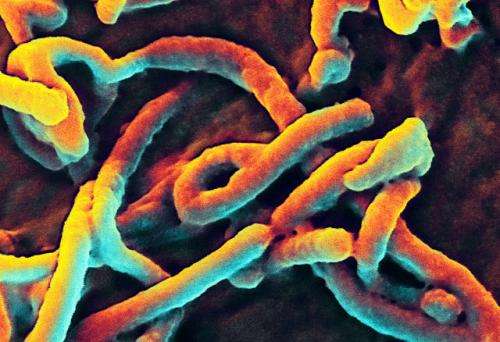Researchers identify protein role in pathway required for Ebola replication

A newly identified requirement of a modified human protein in ebolavirus (EBOV) replication, may unlock the door for new approaches to treating Ebola.
EBOV is one of the most lethal human pathogens known and causes severe hemorrhagic fever in humans. When EBOV makes copies of itself inside cells, it does so by taking over and hijacking parts of that host cell's basic machinery to make its own proteins. The most recent outbreak in 2014 has illustrated the lack of understanding of viral pathogenesis and highlighted the need for increased study of how the Ebola virus replicates.
In the study, fragments of the virus that were not infectious were used to study viral gene expression. Small molecule drugs were used to inhibit the function of a cellular pathway associated with protein synthesis. These drugs and other pathways decreased viral gene expression which suggested that the pathway the drugs blocked is important for the replication of EBOV. To confirm this, the team worked with collaborators at the University of Texas Medical Branch who tested what happened to the ability of EBOV to make copies of itself in the presence of one of the small molecules that they had studied. They found the EBOV made fewer copies of itself when the drug was added. The findings appear in the journal mBio.
To explore why this occurred, the study looked at what happened to specific viral proteins when the pathway was on and off. They found that one of the EBOV proteins, VP30, accumulates in cells when the pathway is on, and it does not accumulate when pathway is turned off. These results suggest that VP30 is the only virus protein for which this happens.
"One protein made by the virus requires an unusual component of the host protein synthesis machinery. We found that if you block the function of this component the virus has problems making copies of itself. Thus, by decreasing how well the virus can make one protein we have an effect on the entire replication cycle," explained corresponding author John Connor, PhD, associate professor of microbiology at Boston University School of Medicine.
According to the researchers these findings identify a uniquely modified human protein that is required for Ebola virus to grow in cells. "Targeting this human protein could represent a new target for Ebola therapeutics. These studies can help us to understand and combat active and dormant Ebola virus infections," he added.
















